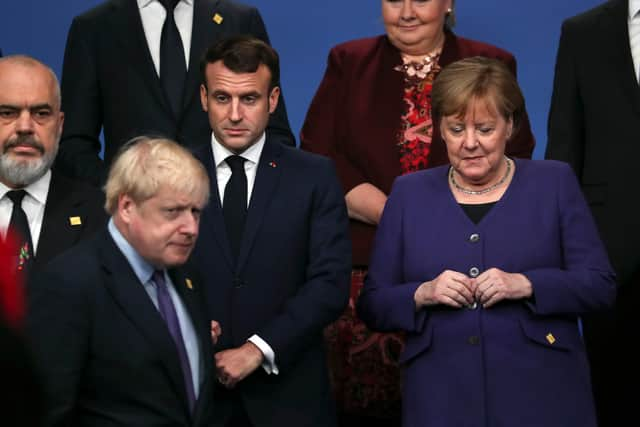Analysis: The personalities behind the Brexit deal stalemate
Despite talks being stuck on the same three issues for at least 100 years, the country is now staring down the barrel of a no-deal Brexit.
Both sides are still talking, we’ve heard a deal is close in every ministerial broadcast interview, but the deadlock remains unbroken.
Advertisement
Hide AdAdvertisement
Hide AdA deal was supposed to have been struck in October, then last week, now rumours suggest it could be so late MPs have to sit Christmas Eve to vote it through. Merry Christmas, I got you more fishing access and a substantial blow to GDP.


Boris Johnson will today ring European Commission president Ursula von der Leyen to assess the situation, with Britain facing the most crucial day in Brexit since the last one. But how did we get here?
Delivering a deal faces the three problems it always has - fishing, state aid and governance, but there’s also egos preventing and stalling breakthroughs on all of the above.
These problems haven’t changed, but seemingly neither have the differences over them.
Take the French president Emmanuel Macron.
He has insisted EU leaders take a hardline stance on state aid, workers' rights and environmental standards, as well as fishing access.
Previous suggestions of a compromise on fishing has been met with fierce opposition from Mr Macron, who has also repeatedly threatened to veto any deal.
Reports earlier this month suggested the EU’s chief negotiator Michel Barnier had come back with a potential fishing agreement, only for it to be dismissed out of hand in France.
This was then supported by other coastal states, including the Netherlands and Belgium, but President Macron is the driving force.
Advertisement
Hide AdAdvertisement
Hide AdMuch like the Prime Minister, Mr Macron is willing to walk away and knows publicly deriding the opponent's position enables him to entrench support at home. A fierce defender of the EU project, he is also determined to deter others from leaving.
There are allies to be found for Britain, but their patience is beginning to wear thin.
Much like with former PM David Cameron, German Chancellor Angela Merkel has sought to find compromise.
Ms Merkel is believed to be wary of no deal and the risk of a double dip recession. She continues to push for an agreement and is backed up by Ireland, which also wants to see compromises made.
Then, of course, there is the PM himself. Playing hardball over the Withdrawal Agreement provided Mr Johnson a huge boost last year, and he knows designating the EU as the “other” is when he’s at his most popular.
Coming at a time his MPs are in open rebellion over the coronavirus restrictions, insisting he’s sticking it to Brussels is a sure-fire way to bring them back around.
The issues are not simply the EU arguing with Britain, no matter how many Tory backbenchers suggest otherwise.
These decisions are one of optics, rather than what’s best for Britain. Adamant that Britain will not give up more fishing rights, the PM is protecting a total catch by UK vessels last year of less than £1 billion.
Treasury figures show a no-deal exit would cost £40bn.
Advertisement
Hide AdAdvertisement
Hide AdThese are disputes over appearances far more than finance, with Brexit showing no signs of getting done.
If you haven't already, please consider supporting our trusted, fact-checked journalism by taking out a digital subscription.
Comments
Want to join the conversation? Please or to comment on this article.
